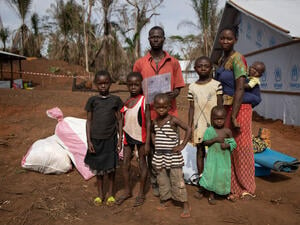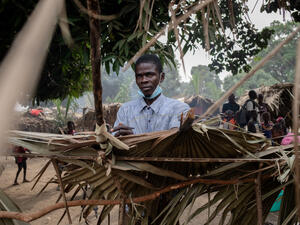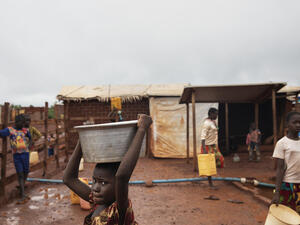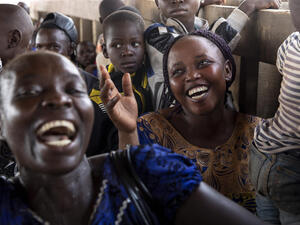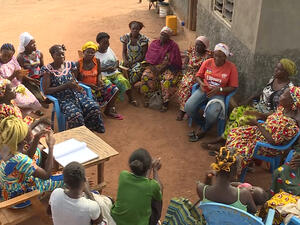Q&A: UNHCR plays vital role in getting Central African refugees to the ballot box
Q&A: UNHCR plays vital role in getting Central African refugees to the ballot box

Refugees waiting to vote in Gado Badzere camp.
BANGUI, Central African Republic, February 12 (UNHCR) - Tens of thousands of refugees will be taking part in the second round of Central African Republic's (CAR) presidential election this weekend with a large slice of help from UNHCR, the UN Refugee Agency. Everyone hopes the election will mark a turning point for the Central African Republic on the road to a lasting and sustainable peace and the imposition of a stable government and the rule of law after years of inter-communal violence, lawlessness, human rights violations and the forced displacement of almost 1 million people, including more than 460,000 people who fled to neighbouring countries. With the support of UNHCR, thousands of these refugees, living in Chad, Cameroon and the Republic of Congo, were able to vote in the first round of the presidential election on December 30. Refugees in the Democratic Republic of the Congo were unable to vote. The refugees in Chad, Cameroon and Republic of Congo will be able to take part in the second round, which will see two former prime ministers competing for the presidency. The winner is expected to be announced by mid-March. Charles Mballa, UNHCR's assistant representative in CAR, has been coordinating the agency's efforts to ensure an inclusive electoral process in close collaboration with the interim CAR administration, host countries, partner organizations and donors. He spoke shortly before the second round with UNHCR Public Information Officer Dalia Al Achi in Bangui about the electoral process: Excerpts from the interview:
Why is it important that refugees take part in the elections?
Approximately 10 per cent of the population has fled to neighbouring countries since the crisis escalated in 2013 [after the rebel Seleka coalition group seized power in March of that year]. It was very important to take them into account and give them the opportunity to choose their future leader and participate in the social and political life of their country. Being a refugee does not mean that your links with your country of origin are completely cut.
Most refugees are longing to go back home. They left because their lives were under direct threat. Most were targeted because of their religious beliefs. Giving them the opportunity to vote in the elections is a first step to re-establishing the broken links and reinforcing their sense of belonging to a country and a nation.
Many CAR refugees had felt abandoned by their government so they were extremely happy to be allowed to vote. Taking part in the first round of the election [on December 30] gave them hope that their voices were being heard. The high turnout of 61 per cent of refugees eligible to vote in these three countries [Chad, Cameroon and the Republic of Congo] was another sign of how important this was for them.
And had they not been allowed to vote, there is a real possibility that they would have felt further marginalized. This could have led to negative reactions among the refugees, reinforcing a feeling of exclusion, and jeopardizing the prospects for an enduring peace.
What was UNHCR's role in the process?
Further to a UN Security Council resolution, and at the request of CAR's National Election Authority [NEA], UNHCR provided technical and logistical support to facilitate the participation of refugees in the elections. We also played a key role in advocating for the amendment of the electoral law to allow refugees to vote. UNHCR pushed for refugee participation in host countries and helped draw up the legal framework allowing them to vote in the three countries.
We also helped the NEA officials and trainers who physically conducted the election in these countries, by producing information for the refugees, identifying polling stations, and transporting and delivering non-sensitive electoral materials to polling sites. UNHCR staff also helped some voters to go to the polling stations. We were present at most of the polling sites throughout the day, monitoring security and the health of the refugees.
What have been the main challenges?
At one stage it looked like there would be no refugee participation because the politicians were divided on the issue. In June, the National Transitional Council [interim parliament] had rejected an amendment of the electoral law to allow refugees to vote. It required additional advocacy efforts and discussions before the Constitutional Court ordered that the new law include refugee participation in the presidential election. Convincing asylum countries to allow elections on their soil was another challenge. Some had security concerns, others did not want to see refugees involved in political activities. Funding was an issue and there were logistical constraints, especially in Cameroon where 70 per cent of Central African refugees do not live in camps.
The tight deadlines also caused problems along with a lack of capacity and trained electoral personnel, especially during the referendum on December 13 on a new constitution, which was marred by violence that left at least 10 people dead. The referendum turnout among refugees was under 50 per cent and many ballots were spoiled due to mistakes made in filling them out.
Was the first round of the presidential ballot a success in terms of refugee participation?
Refugees voted and this in itself is a success. Almost 61 per cent (33,000) of the refugees registered to vote in the three host countries were able to cast a ballot. This compared to a turnout of about 62 per cent of voters inside Central African Republic. We hope to see a similar good refugee participation in the second round. The enthusiasm with which people headed to the polling stations inside the Central African Republic, despite the risk of violence, is a clear indication that CAR's population is putting a lot of hope in these elections and wants to turn the page. This country has suffered five coups d'états since independence from France in 1960. These elections will hopefully represent a first step towards the rule of law in CAR.
The new leader and government will face immense challenges: the disarmament and reintegration of armed groups, the restoration of state authority and the rule of law, the rehabilitation of basic infrastructure, economic recovery, the return of refugees and solutions for people displaced within the country. UNHCR will have its part to play.
What have you learned from this process so far?
The most important lesson is that in similar circumstances in the future, we should advocate much earlier in the process for the participation of refugees in elections. If the preparations were launched earlier, a good advocacy tool could have been introduced in time to allow us to sign agreements with asylum countries much earlier [and start the process earlier]. Another lesson is to allocate sufficient time and resources to disseminate information on the electoral process and provide voter education so that they can make a much more informed decision.
Do you have any special memories of the election?
One of the most moving things I heard was the story of a refugee in Betou, in the Republic of Congo. He sought refuge there 35 years ago. When he heard about the elections, he thought it was a joke and that they would never find his name on the voter lists. But he decided to take his chance, walking hundreds of kilometres to reach the voter registration centre. When he found his name on the list, he burst into tears. He registered and voted. This is a memory that is very dear to my heart.

